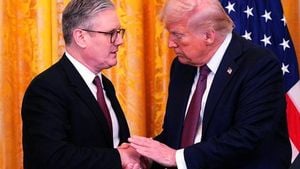In a recent interview, U.S. President Donald Trump has reignited his controversial rhetoric regarding the annexation of Greenland, a self-governing territory of Denmark. Speaking to NBC News on May 4, 2025, Trump stated, "I don’t rule it out. I don’t say I’m going to do it, but I don’t rule out anything. No, not there. We need Greenland very badly. Greenland is a very small amount of people, which we’ll take care of, and we’ll cherish them, and all of that. But we need that for international security." This statement has raised eyebrows, not only in Greenland but also among international observers who are wary of the implications of such threats.
Trump's renewed interest in Greenland aligns with his previous comments about the territory, which he has described as crucial for U.S. national security and economic interests. According to CNN, he has expressed a desire to acquire the resource-rich island, emphasizing its strategic location between the U.S. and Europe. Experts suggest that Greenland's geopolitical significance is heightened by its position along key shipping lanes and its potential natural resources, including oil, gas, and rare earth metals, which are increasingly sought after in the context of climate change and the global shift towards renewable energy.
Greenland's Prime Minister Jens-Frederik Nielsen has firmly rejected Trump's claims, stating earlier this year, "President Trump says that the United States ‘will get Greenland.’ Let me be clear: The United States will not get it. We do not belong to anyone else. We decide our own future." This sentiment is echoed by many Greenlanders who are concerned about the implications of Trump's comments and the historical context of colonization.
Trump's expansionist rhetoric has not been limited to Greenland. He has also made headlines by suggesting that Canada could become the "51st state" of the U.S. This has strained relations with Canada, especially following the recent federal elections in which the Liberal Party, led by Prime Minister Mark Carney, won amid a wave of anti-Trump sentiment. Carney has stated that Canada would "never" yield to U.S. pressure, highlighting the growing tensions between the two neighboring countries.
In his NBC interview, Trump acknowledged that while he finds it "highly unlikely" he would use military force to annex Canada, his comments have nevertheless sparked concern. "I don’t see it with Canada. I just don’t see it, I have to be honest with you," he said. However, the mere suggestion of such actions has led to increased scrutiny and anxiety among Canadian officials.
Trump's approach to foreign policy has drawn comparisons to past U.S. presidents who have sought territorial expansion, raising questions about the implications of such a mindset in the 21st century. Critics argue that Trump's mercantilist perspective—viewing international relations as a zero-sum game—could undermine long-standing alliances and destabilize global order. His administration's actions have already caused unease among allies, particularly in light of his previous threats to annex territories and unilaterally alter borders.
Greenland's unique position between superpowers has made it a focal point of geopolitical interest. The island's vast resources, coupled with its strategic location, have led to increased attention from both the U.S. and China. Some Greenlanders, like Jorgen Boassen, who describes himself as Trump's "Greenlandic son," view the president's interest as an opportunity for greater independence from Denmark. Boassen believes that Trump's rhetoric could help Greenland negotiate better terms with its current governing body, stating, "I think that we have better cards in Greenland because of Trump. He's a businessman, of course, America first, but we also have used this momentum to try to get some of that."
However, this perspective is not universally shared among Greenlanders. Many are wary of Trump's intentions and the potential for increased military presence on the island. Nive Heilmann, a dog trainer in Greenland, expressed concerns about the historical trauma associated with colonization, stating, "Donald Trump's comments have caused deep fear among Greenlanders and are re-traumatizing a people who've been colonized before." Heilmann's sentiments reflect a broader unease about the implications of U.S. expansionism.
Greenland's government has been quick to condemn Trump's comments, emphasizing that the territory is not for sale. Mineral Resources Minister Naaja Nathanielsen has stated, "We understand why they have these concerns, and this is really an open door for us. We are open to discussing military installations or others in Greenland besides the base they already have." This indicates a willingness to engage with the U.S. on certain terms, but it also underscores the complexity of the relationship between Greenland, Denmark, and the U.S.
As Trump continues to express his interest in territorial expansion, the reactions from both Greenland and Canada suggest a growing resistance to his rhetoric. The historical context of colonization, combined with contemporary geopolitical realities, complicates the prospect of any potential annexation. The international community is watching closely as these developments unfold, with many questioning the long-term implications for U.S. foreign policy and global stability.
In conclusion, Trump's recent comments regarding Greenland and Canada highlight a contentious approach to foreign policy that raises concerns among allies and territories alike. As geopolitical dynamics shift, the importance of respecting national sovereignty and historical contexts cannot be overlooked. The future of Greenland, and its relationship with both Denmark and the U.S., remains uncertain, but the stakes are undeniably high.




